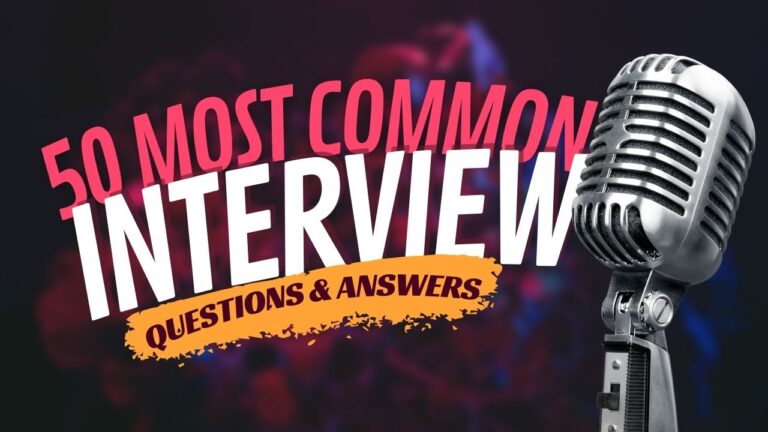21 Common Teacher Interview Questions and Answers: Essential Tips for Success

Walking into a teacher interview can feel like entering a new classroom for the first time. Preparation is the key. You want to showcase why you’re the perfect fit for the school, and understanding what questions to expect can boost your confidence.

During teacher interviews, you are likely to face a variety of common questions aimed at assessing your teaching philosophy, classroom management skills, and how you handle challenges.
Think about how you can discuss specific experiences that highlight your strengths. This approach not only answers the questions but also gives your interviewer a glimpse into your personality and teaching style.
Being familiar with common teacher interview questions helps you articulate your passion for teaching and your commitment to student success. By knowing what to expect, you can focus on crafting genuine and thoughtful responses.
This post will guide you through 21 potential questions and provide strong answers to each question, helping you stand out in your next interview.
Understanding the Interview Structure

Teacher interviews often have a set structure. Knowing what to expect can help you feel more confident and prepared.
Interviews usually begin with introductory questions. These might include asking about your background or why you want to be a teacher. Your answers to these questions set the tone.
Behavioral questions are a major part of many interviews. These questions ask how you’ve handled situations in the past. They give insight into your problem-solving skills and experience.
Sometimes, you might be asked situational questions. These are hypothetical scenarios where you need to explain how you would handle certain challenges.
An interview might also include a teaching demonstration. This allows you to showcase your teaching style and how you engage with students.
Understanding these components can help you navigate the interview confidently. Familiarizing yourself with this structure allows you to practice effectively and communicate clearly.
21 Common Teacher Interview Questions and Answers

- Can you describe your teaching philosophy?
Your teaching philosophy should show your passion for education. You might focus on student-centered learning or fostering critical thinking. Express how you’d adjust strategies to meet students’ unique needs. Focus on student-centric approach and mastering a particular subject. - How do you handle classroom management?
Emphasize proactive strategies. Point out ways you establish rules early and use positive reinforcement. Share any specific techniques, like interactive activities, to keep students engaged. You can highlight any certifications and your experience about classroom management. - What methods do you use to keep students engaged?
Discuss using varied instructional methods. You might use technology, group activities, or inquiry-based learning. Describe times when you’ve successfully increased participation.
You can highlight key aspects like – Technology Integration, Group Activities & Collaborative Learning, Inquiry-Based Learning and Active Participation of the students. - How do you incorporate technology in your lessons?
Mention specific tools like interactive whiteboards or educational apps. Explain the purpose they serve, such as enhancing collaboration or simplifying complex concepts.
Additional Pointer: I often use interactive platforms like Quizlet, and Google Classroom to create interactive quizzes, games, and discussions. These tools allow students to participate in a fun, competitive way while reinforcing the content. For example, in a recent history lesson, I used an interactive timeline on Google Slides where students could click through key events and then work in pairs to discuss how these events shaped history. - How do you handle a student who is struggling academically?
You could offer one-on-one support or use peer mentoring. Specify how you’d modify instructions or use formative assessments to identify struggles earlier.
When a student is struggling academically, my approach is always centered on providing support, fostering a growth mindset, and identifying the root cause of the struggle. I believe that every student is capable of learning and succeeding with the right tools and encouragement. - Describe a successful lesson you’ve taught.
One of the most successful lessons I taught was during a unit on ecosystems in a 7th-grade science class. The objective was to help students understand the relationships between different components of an ecosystem, such as producers, consumers, decomposers, and how energy flows through an ecosystem. I wanted to create an engaging and interactive lesson that would make the concept clear, memorable, and applicable to real-world scenarios. - How do you communicate with parents?
Mention using Classroom Apps and Online Portals, newsletters, emails, or parent-teacher meetings. Include examples of how effective communication supports student success.
One of the primary ways I keep parents informed is through regular email updates or a weekly newsletter. These updates include important dates, upcoming assignments or projects, and any key concepts we’re covering in class. I also highlight individual or class achievements, providing a positive reinforcement for students’ efforts. For example, if we’re about to start a new unit or if there’s an important test coming up, I make sure parents are aware so they can support their child at home. - How do you assess student progress?
Explain using both formative and summative assessments. Detail methods like quizzes, projects, or portfolios to gauge understanding. - What strategies do you use for differentiation?
Discuss adapting lessons to fit various learning styles. Highlight techniques like tiered assignments or offering choices in how students demonstrate learning. - How would you support students with special needs?
Describe collaborating with special education teachers. Provide examples of accommodations or specialized teaching strategies. - How do you handle conflicts in the classroom?
Explain addressing conflicts calmly and promptly. Discuss techniques like mediation or involving counselors if needed. - How do you stay current with educational trends?
Talk about attending workshops or online courses. Mention reading professional journals or being part of teacher networks. - How do you handle criticism from colleagues or supervisors?
Emphasize openness and the willingness to learn. Share an instance where feedback improved your teaching. - What role do standardized tests play in your teaching?
Discuss using test results to inform instruction. Talk about balancing test prep with broader educational goals. - How would you handle a disruptive student?
Detail steps like a private conversation or changing seating. Mention involving parents or administration if disruptions continue. - Why do you want to teach at this school?
Personalize your response by mentioning specific programs or values of the school that align with yours. - How do you motivate students who are reluctant learners?
Use examples of offering rewards, involving student interests, or setting achievable goals. - What has been your biggest teaching challenge, and how did you overcome it?
Share a story about a significant obstacle and the strategies you employed to resolve it.
Sample: One of the biggest teaching challenges I faced occurred during my first year of teaching, when I was assigned a classroom with a highly diverse group of students in terms of learning abilities, backgrounds, and interests. This included students with a wide range of academic levels, as well as several who were English language learners (ELLs) and students with special educational needs. The challenge was meeting the individual needs of each student while ensuring that everyone had an equitable opportunity to succeed in the classroom. - How do you contribute to a positive school culture?
Mention participating in extracurricular activities or school committees. Share how you promote teamwork among colleagues.
1. Creating and contributing to a positive school culture is something I am deeply passionate about. I believe that a supportive, inclusive, and collaborative environment benefits not just students but also teachers and staff, ultimately fostering a school community where everyone feels valued and motivated.
2. One of the most important elements of a positive school culture is the relationships we build within the school community. I make it a priority to form strong, respectful relationships with my students, colleagues, and parents. For students, I work to create a classroom atmosphere that is warm, safe, and welcoming, where they feel comfortable taking risks and expressing themselves. I show genuine interest in their lives outside of academics, whether through casual conversations or by celebrating their achievements, which helps build trust and rapport. - How do you plan lessons?
Describe using a set framework like backward design. Include aligning lessons with standards and student needs.
Lesson planning is a fundamental aspect of effective teaching, and I approach it with careful thought and structure to ensure that all students are engaged and meet the learning objectives. My lesson planning process is flexible, allowing for adaptation based on students’ needs, but also intentional, with clear goals and outcomes in mind. - What are your expectations from school leadership?
Express the desire for support, clear communication, and professional development opportunities.
Effective school leadership is crucial for fostering a positive and productive learning environment, and I believe that strong leadership sets the tone for the entire school community. As a teacher, I have a few key expectations from school leadership that I believe would support my success in the classroom and help the school management.
Demonstrating Your Teaching Skills

When preparing for a teacher interview, you need to show your expert teaching skills. Focus on your subject matter expertise and how your teaching methods engage students effectively. Use specific examples that demonstrate your abilities.
Highlighting Your Subject Matter Expertise
Show your deep knowledge of the subject you teach by sharing examples from your teaching experience. Discuss the instructional strategies you use that help students grasp complex concepts. This could involve interactive methods such as group activities or technology integration.
You could create a list of teaching strategies that improve understanding, like hands-on projects or visual aids. Explain how these strategies have been successful in previous classes. Be specific about the outcomes you’ve achieved, such as improved test scores or increased student participation.
Share how you stay updated with the latest trends in your field. This demonstrates to interviewers that you are committed to lifelong learning, which benefits your students.
Finally, discuss feedback from colleagues or supervisors that highlights your strengths, offering a well-rounded view of your expertise.
Preparing for Common Pedagogical Questions

When getting ready for pedagogical questions in a teaching interview, consider focusing on lesson planning and adapting to diverse learning needs.
These areas show your ability to create effective learning experiences and adjust teaching methods to suit different students.
Approaches to Lesson Planning
Effective lesson planning is crucial for successful teaching. Start by identifying clear objectives for each lesson. These objectives should align with curriculum standards and address students’ needs.
Use a variety of teaching methods to keep students engaged. Incorporate interactive activities like group discussions or hands-on projects. Always have a structured format including an introduction, main activities, and a conclusion.
Formative assessments help monitor student progress. These can be quizzes or class discussions. Adjust lesson plans based on assessment outcomes to meet learning targets.
Adapting to Diverse Learning Needs
Students have varied learning styles, so differentiation is key. Offer multiple ways to access content, such as visual aids, audio clips, or hands-on activities. This ensures all students can engage with the material.
Implement differentiated instruction to address different skill levels. Provide additional support or challenges as needed. Encourage peer collaboration, allowing students to learn from each other.
Create an inclusive classroom environment by being aware of cultural backgrounds and learning preferences. Ensure resources are accessible to students with different needs, making the learning space supportive and welcoming for everyone.
Teacher Interview Frequently Asked Questions

In teaching interviews, you’ll often be asked about student engagement, lesson differentiation, classroom management, assessment methods, and technology use.
Each of these areas plays a crucial role in your teaching strategy.
What strategies do you use to engage students who are reluctant to participate?
To engage reluctant students, you might use interactive activities, group work, or individualized attention. Building a rapport and understanding their interests can help. Using varied instructional methods like games or discussions also encourages participation.
How do you differentiate your instruction to meet the needs of all learners?
You can differentiate instruction by using varied materials and activities to address different learning styles. Offering choices in assignments and providing resources at various reading levels can meet diverse needs. Assessing students individually helps adjust lessons to fit their abilities.
How do you handle classroom management and discipline?
Effective classroom management starts with clear rules and consistent routines. Positive reinforcement encourages good behavior, while addressing issues promptly maintains order.

What methods do you use to assess student learning and progress?
Assessment methods could include quizzes, projects, presentations, or observations. It’s important to use both formative assessments like regular check-ins and summative assessments like tests.
This combination helps track ongoing progress and final understanding.
How do you integrate technology into your lessons and curriculum?
Integrating technology can involve using educational apps, online resources, or interactive whiteboards. Technology can enhance learning through virtual experiments or providing different platforms for student collaboration.
Staying updated with new tools keeps lessons engaging and relevant.
All the Best !






